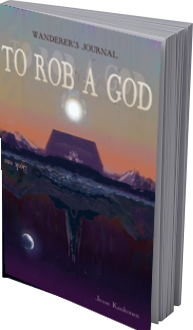A story, encouragement, and advice
When I was 29, I read Will Wight’s Cradle. I was on a vacation, and to my surprise I managed to read one novel per day. Before Cradle, not a single book series had captivated me to that level. On the fifth day, as I finished Ghostwater, the 5th and last novel in the series at the time, I lowered my ebook reader in my lap and stared at my silent apartment. Then, in a burst of inspiration, I said the line so common to many others:
“I bet I could do that.”
That same day I started learning writing. At the time I had no prior experience in writing excepting the few stories I wrote for our P&P RPGs as a kid. I learned with an engineer’s mindset, breaking the abstract problems into concrete, tiny tasks, learning each topic with an organized schedule as though participating in an actual degree at a university. After one year of hard work, I finished my first novel. It was awful. During the following year, I wrote a second one. It was less awful. By that time I hadn’t told anyone I was writing and hadn't shared my stories with anyone. I constantly self-reflected, attempting to see where I could improve. After the second novel I reached the level where I no longer saw any flaws in my writing. So, was that it? Was I done?
No. That meant it was time for a second opinion. I joined the Helsinki Writers’ Group and attended their meeting, reading my own story for the first time ever to a room full of strangers. As I finished and lowered my ebook reader, no one spoke. People looked at the table with frowns. Someone glanced up, but didn’t say anything. I’m not one easily troubled, but I’ll admit, that was a moment that made me somewhat anxious.
Then the feedback started coming in, and to my relief, they didn’t destroy my aspirations. People had a lot to say, although the only concrete things I remember from that evening was someone teaching me about filter words and people talking about the chapter I read not being fit for opening a novel.
Years went, and I continued my pace of writing one novel per year. I joined a new writers’ group specifically created for novelists, and there, in this group, in the direct, blunt, and sometimes ruthless feedback, I honed my skill. The logo of that group is a steel crucible, which symbolizes how sometimes to create something beautiful, difficult and painful things have to be done. In the years that followed, my writing improved by huge leaps. I met other writers who had written and published novels, and absorbed their knowledge like a sponge.
My 3rd novel, which to this day shall remain a mystery, suffered from several problems. The plot hit the characters like the ocean and they simply went with it, never making any decisions out of their will. As I reached the 150 000 word mark, I had in my hands a boring story where the characters had little chance for growth. Someone from Helsinki Writers’ Group, without even reading the novel, had the insight to point out my problem was likely with lack of agency or too little proactivity.
Nerguiin was born out of that feedback.
By the time I was done writing my fourth novel on the fourth year, I knew I was going to make it. That book was the Wanderer’s Journal.
Writer’s block
In Frank Herbert’s Dune, Paul Atreides says something along the lines: “Most people don’t realize learning is a skill they can learn.” It took me until my early twenties to learn that, which was also the time I gained some ability in self-reflection and introspection. A lot of people talk about having a writer’s block, or say they are lazy, or they procrastinate. Too few understand that these are not the sickness - they are the symptoms. There is exactly one way to write a novel: one day at a time. To manage multiple days in sequence, one must first learn routine. And if routine is something you aren’t capable of following, that is the underlying problem you will want to resolve.
But how does one solve a problem of such a nature? Luckily, we have people in our society who specialize in precisely that sort of problem solving: therapists and counselors. As I’ve matured, I’ve discovered mental health to be something that I realized I was conditioned to not really express. Old taboos still linger, and people are afraid of inconveniencing others. In too many places we still associate mental health as the extreme examples of depression or insanity, when, for the average person, it is the small things that ultimately obstruct them from doing what they want. Why shouldn’t you ask an expert for help if there something you’re passionate about, but for reasons you don’t understand, aren’t able to accomplish?
I can’t solve your writer’s block, for everyone’s mind is a different place. You must first build a solid foundation that allows you to work on difficult things for hundreds or thousands of hours, with a steady routine that works for you. Don’t pick something arbitrary and stick to that - experiment for a few months at a time and observe the results. I wrote my first novel by writing after work, but eventually realized that was causing me too much stress and I moved to writing only on weekends. For some time I made use of my lunch breaks by planning on what to do each weekend, but noticed I needed a proper break during my programming job, as spending the entire day thinking left my mind on overdrive that lingered even after my work for the day was done. Recognize your limits, and build a steady, repeating routine.
Everyone has different solutions to getting their words written. Will Wight has someone else in the room with him, responsible for making sure he’s actually writing. Every time his fingers stop moving for too long, the other person in the room asks why he has stopped. Kevin J. Anderson goes on hikes and dictates while walking. Jason Janicki writes at a steady pace after his daytime job with a routine, and that allows him to write some 300 000 words per year. And while Brandon Sanderson writes 6 novels between his novels, we don’t talk about him here and you shouldn’t compare yourself to someone who holds a Shard of Adonalsium. Comparing yourself to others is rarely helpful - only think about your own progress, not what others are doing, and find the method that gets you finishing novels. If you absolutely have to compare, simply observe what works for different authors and learn from that.
However, I can offer some suggestions.
If you ever think you need inspiration or a muse to write, and without those you can’t do anything, ask yourself: what will you do if you will never, for the rest of your life, have inspiration again? I assume you would still want to write. The less attractive aspects, the sausage making of writing, is that most of it can be accomplished by a good understanding of storycraft, the theory. If you enter into the academic debates about writing, you’ll find people arguing that there are a grand total of six different stories, and every story is simply a modification of those existing structures. If a story is enjoyable, it likely is written in a three act structure. If a story feels like it ends at the right time, it was likely written with a good sense of pacing. If it feels like a character’s story comes to a satisfying point, they most likely completed the textbook version of the Hero’s Journey. If the story is engaging, it makes good use of building tension.
As I do the bread & butter writing of words in my first drafts I barely need what one might call inspiration. I use an outline that is built with the basic understanding of storycraft. I use previously completed worldbuilding to paint the visuals, and later tie elements of the world to the character’s inner conflict. I analyze tension, and find satisfying points to resolve it. I ask how a character should change, and find the good point for that change to conclude. All of this highly mechanical, with little inspiration to it.
Outlines aren’t for everyone, yet that is the way I write. My attempts in discovery writing (or "pantsing", or "gardening") usually result in me getting stuck, in a form of a writer’s block. And once stuck, the solution for me is to realize this way of working isn’t getting me a completed novel and I have adjust the way I work. Always ask yourself: during the past week, did you make good progress to getting closer to completing a novel? If not, something in the way you work is likely not suited for you.
The concrete advice
While I can’t enter your mind and fix things for you, I can give you some basic tools that might work. They sometimes do for me.
- If you don’t know where to take your story, go for the age-old adage: Conflict is the engine of storytelling, and when stuck, introduce trouble.
- If after a while you haven’t written anything (the "blank page syndrome"), start writing anything at all. Describe what the main character has in her handbag, or how they go shopping for a new troll-slaying axe. It does not matter what you write, as long it gets your character doing something, which ultimately gets you in that character's head. Eventually you might notice yourself capable of proceeding with what you planned to do in the first place.
- Some people have the kind of minds that wander from one project to another, and for them the solution can be to have three or four stories (or different creative pursuits) going on in parallel. When you get stuck with one, shift gears and do the other thing. Cycle through projects, but don’t start more than a set number before the old work is finished - otherwise you'll find yourself always starting new things but never finishing the old ones.
- Force yourself to write. Stay at the computer, write anything, struggle at it, and, possibly, eventually, you’ll get the writing done. Not the pleasant advice and definitely not suited for everyone, but some people are what might be called slow acceleration, high max speed. Maybe you are such a person. For me, the first two hours of writing are rarely very productive, but I pick speed as I keep going. You may even involve other people in this, commanding them to be your "drill sergeant". There are a fair amount of people who, after attending a military boot camp, discover the strict disciple to have been highly beneficial to their lives.
- Write with other people. This does not work for me, but I know others who get most of their stuff done with group pressure. Make sure to use agreed & regular schedules.
- Don’t go back to fix things before your first draft is done, unless you are one of those weird people who manage to get everything right in a single draft. My first drafts are awful, which is typical to writers. I don’t go back to edit old texts before I have completed the whole draft. Why should I? Sometimes I rewrite half the novel after I have analyzed it, so there’s no point to spending time on scenes that might not be there later.
- If your problem is getting started, understand that brains can be conditioned. Every time you start writing, do the exact same things: put on the same music, make the beverage you only drink when writing, lower the temperature in your apartment, do the kind of physical exercise that you only do before writing... whatever it is, teach your brain that this activity is always followed by writing. With enough work, it may help.
- If you are one of those people who starts projects but doesn’t finish them, ask why. Don’t permit yourself to start new projects before the old ones are done. And if you have a tirefire of a novel that isn’t going anywhere and you don’t want to continue it anyway, do the rare thing and just start a draft analysis early: understand what you love and hate in the novel. Understand what you are indifferent to. Isolate elements mandatory to the plot, cut the useless things, and find parts that need enhancement. Then, with your lists of characters, plots, places, setting, magic, and items shrunk down, design a new outline with what remains. I only do this at the end of my first draft, but if this is stopping you from getting there, do it several times to get moving.


